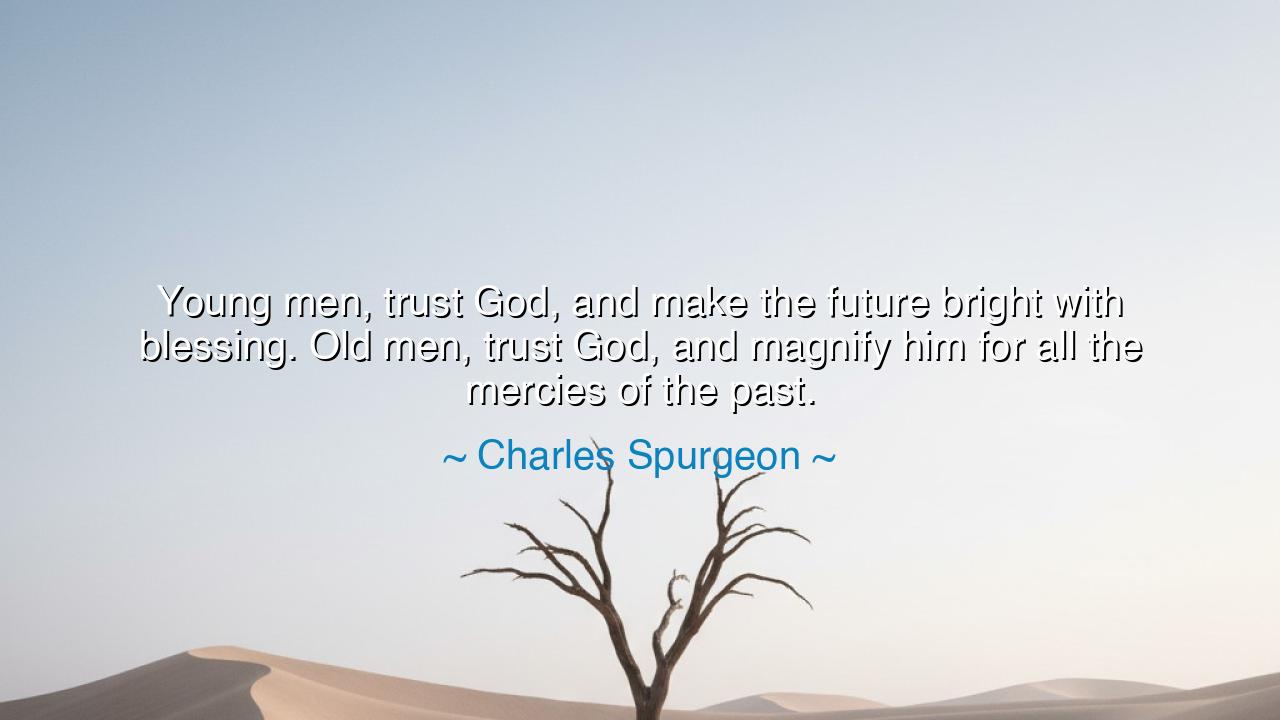
Young men, trust God, and make the future bright with blessing.
Young men, trust God, and make the future bright with blessing. Old men, trust God, and magnify him for all the mercies of the past.






The preacher Charles Spurgeon, the “Prince of Preachers,” whose words once thundered from London pulpits like divine fire, spoke this timeless exhortation: “Young men, trust God, and make the future bright with blessing. Old men, trust God, and magnify him for all the mercies of the past.” In these two sentences, Spurgeon distilled the essence of faith through the ages — that both youth and age, beginning and ending, spring and winter, are bound together by trust in God. His words bridge generations; they are a commandment to the living: to see life not as a march toward decay, but as a sacred journey where each season bears its own light.
In the manner of the ancients, let us look upon this teaching as both promise and duty. To the young, Spurgeon speaks with the vigor of dawn: Trust God, and make the future bright with blessing. For youth is the morning of the soul — restless, ambitious, eager to shape the world. Yet without faith, its strength turns to recklessness; its passion, to waste. To trust God in youth is to anchor one’s dreams in the eternal, to build not on shifting sand but on the rock of divine purpose. Spurgeon knew that the energy of youth, when guided by faith, becomes not mere motion, but creation — the birth of goodness, art, and virtue that blesses generations to come.
And then he turns, with gentleness and reverence, to the elders: Old men, trust God, and magnify him for all the mercies of the past. Here is the evening wisdom, the peace that follows labor. Spurgeon, who had seen both glory and grief in his own ministry, reminds the aged that gratitude is the crown of faith. For what is life but a procession of mercies, often unseen until we look backward? To magnify God in old age is to turn memory into worship, to see in every sorrow a thread of grace. Thus, youth looks forward with hope, and age looks backward with praise — and in both directions, the same light of trust shines eternal.
In Spurgeon’s time — the nineteenth century — his message carried special power. The Industrial Revolution had altered the rhythm of life; cities grew vast and impersonal, and faith seemed to flicker beneath the engines of progress. Yet Spurgeon’s voice rose above the noise, calling both young and old to remember that human strength alone cannot build or sustain the world. In his church, the Metropolitan Tabernacle, he saw thousands — workers, scholars, mothers, soldiers — each carrying burdens of doubt or weariness. To them he spoke these words as healing: the young need not fear the uncertain tomorrow, and the old need not mourn what is gone. Both may find peace in the same place — the steadfastness of divine mercy.
Consider, as a living reflection of Spurgeon’s words, the life of George Washington Carver, born into slavery yet rising through trust and perseverance to become one of history’s most brilliant scientists. In his youth, he sought education despite impossible odds, trusting that his calling came from God and not from circumstance. His faith made the future bright with blessing, not only for himself but for countless others whom his discoveries fed and inspired. In his old age, he gave glory to God for every mercy — the hardships that taught him resilience, the failures that forged wisdom, the successes that humbled him. Thus, in one man’s life, we see both halves of Spurgeon’s truth joined as one.
There is a rhythm to this quote — a sacred balance between action and reflection. The young man’s trust must be active, creative, outward, shaping the world with hope. The old man’s trust must be contemplative, inward, full of thanksgiving. One builds, the other blesses; one plants the seed, the other praises the harvest. Together they complete the circle of faith. To live only in the future is to forget gratitude; to live only in the past is to lose vision. But to trust God in both directions — in youth and in age — is to live a whole life, complete in purpose and peace.
O children of time, heed this wisdom: wherever you stand — at dawn or dusk, in promise or remembrance — lift your eyes to the same unchanging Light. If you are young, work boldly, not in pride but in faith, knowing that your strength is a gift. If you are old, give thanks without regret, for every breath you took was sustained by mercy. Let the young learn reverence from the old, and the old draw joy from the young. For in this sacred exchange — of hope and gratitude, of faith across generations — lies the brightness of the future and the glory of the past.
Thus, the lesson of Spurgeon’s words endures: Trust God, always. Trust Him when you build, and trust Him when you rest. Trust Him when your hands are strong, and when they tremble. For time itself is but the shadow of eternity, and those who walk in faith will find that both the past and the future are filled with the same endless grace.






AAdministratorAdministrator
Welcome, honored guests. Please leave a comment, we will respond soon